Theories and Principles of Learning and Communication Analysis
VerifiedAdded on 2020/12/24
|17
|6181
|137
Report
AI Summary
This report delves into the critical role of learning theories, communication principles, and curriculum development in education. It examines various theories, including those of Jean Piaget, Behaviorist theory, and Lev Vygotsky, illustrating their application in teaching practices. The report analyzes the importance of effective communication between teachers and students, emphasizing the need for teachers to understand different learning styles. It also explores models of learning assessment, such as Kolb's experiential learning cycle, and evaluates their effectiveness in stabilizing learning for diverse learners. Furthermore, the report discusses theories and models of curriculum development, providing a comprehensive overview of how these elements contribute to enhancing teaching skills and student engagement. The assessment highlights the importance of self-reflection for teachers in developing their skills and evaluating the effectiveness of their competencies.
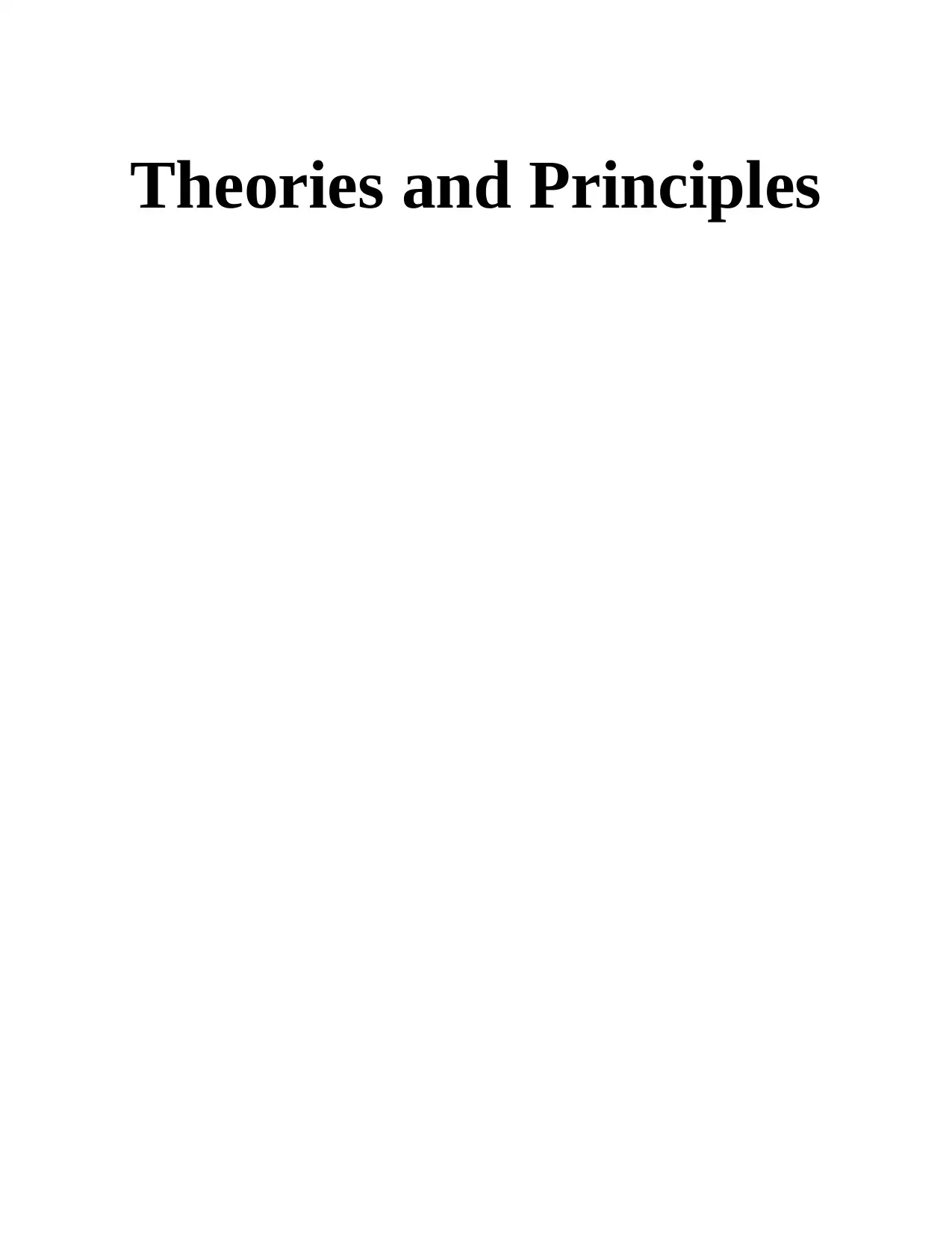
Theories and Principles
Paraphrase This Document
Need a fresh take? Get an instant paraphrase of this document with our AI Paraphraser
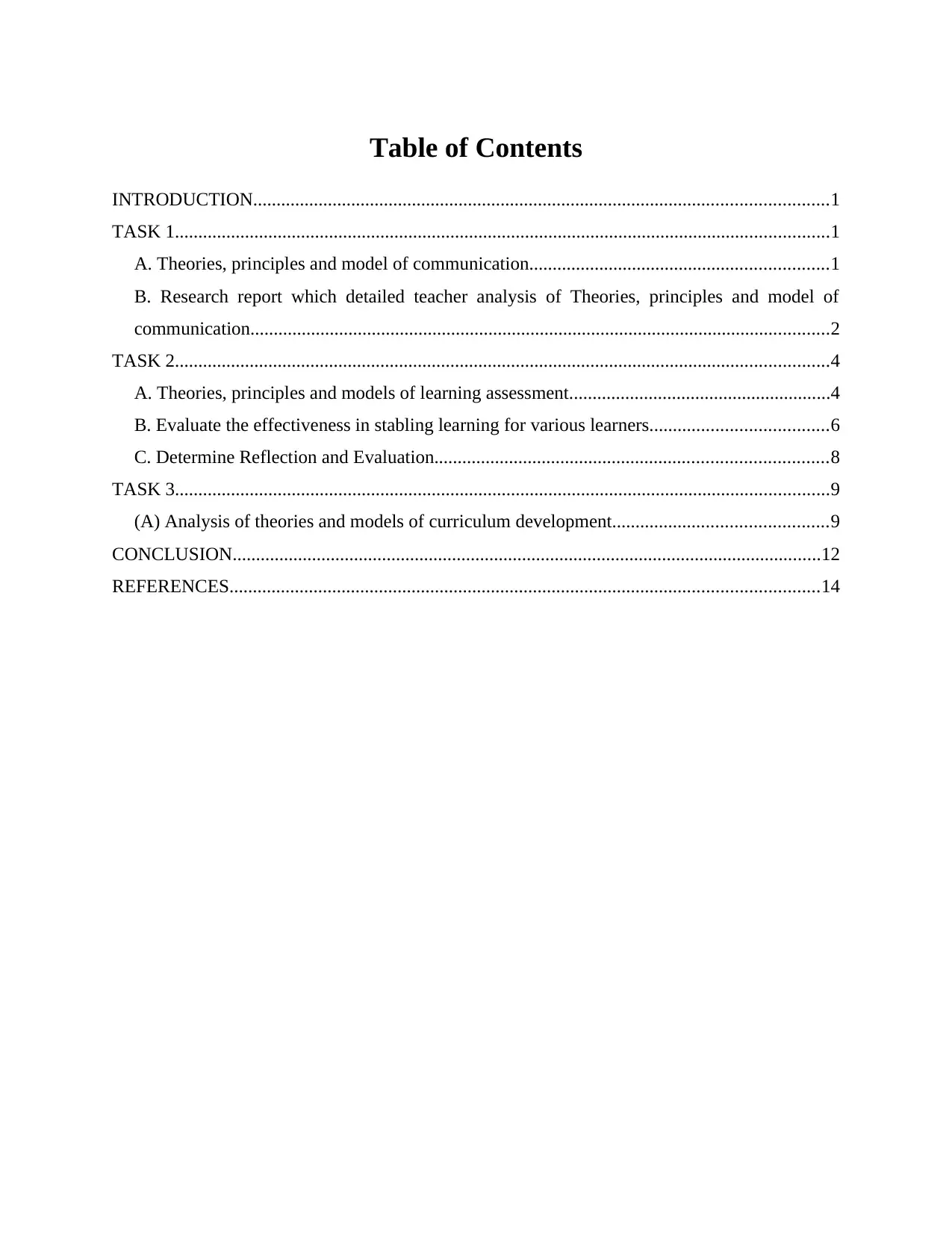
Table of Contents
INTRODUCTION...........................................................................................................................1
TASK 1............................................................................................................................................1
A. Theories, principles and model of communication................................................................1
B. Research report which detailed teacher analysis of Theories, principles and model of
communication............................................................................................................................2
TASK 2............................................................................................................................................4
A. Theories, principles and models of learning assessment........................................................4
B. Evaluate the effectiveness in stabling learning for various learners......................................6
C. Determine Reflection and Evaluation....................................................................................8
TASK 3............................................................................................................................................9
(A) Analysis of theories and models of curriculum development..............................................9
CONCLUSION..............................................................................................................................12
REFERENCES..............................................................................................................................14
INTRODUCTION...........................................................................................................................1
TASK 1............................................................................................................................................1
A. Theories, principles and model of communication................................................................1
B. Research report which detailed teacher analysis of Theories, principles and model of
communication............................................................................................................................2
TASK 2............................................................................................................................................4
A. Theories, principles and models of learning assessment........................................................4
B. Evaluate the effectiveness in stabling learning for various learners......................................6
C. Determine Reflection and Evaluation....................................................................................8
TASK 3............................................................................................................................................9
(A) Analysis of theories and models of curriculum development..............................................9
CONCLUSION..............................................................................................................................12
REFERENCES..............................................................................................................................14
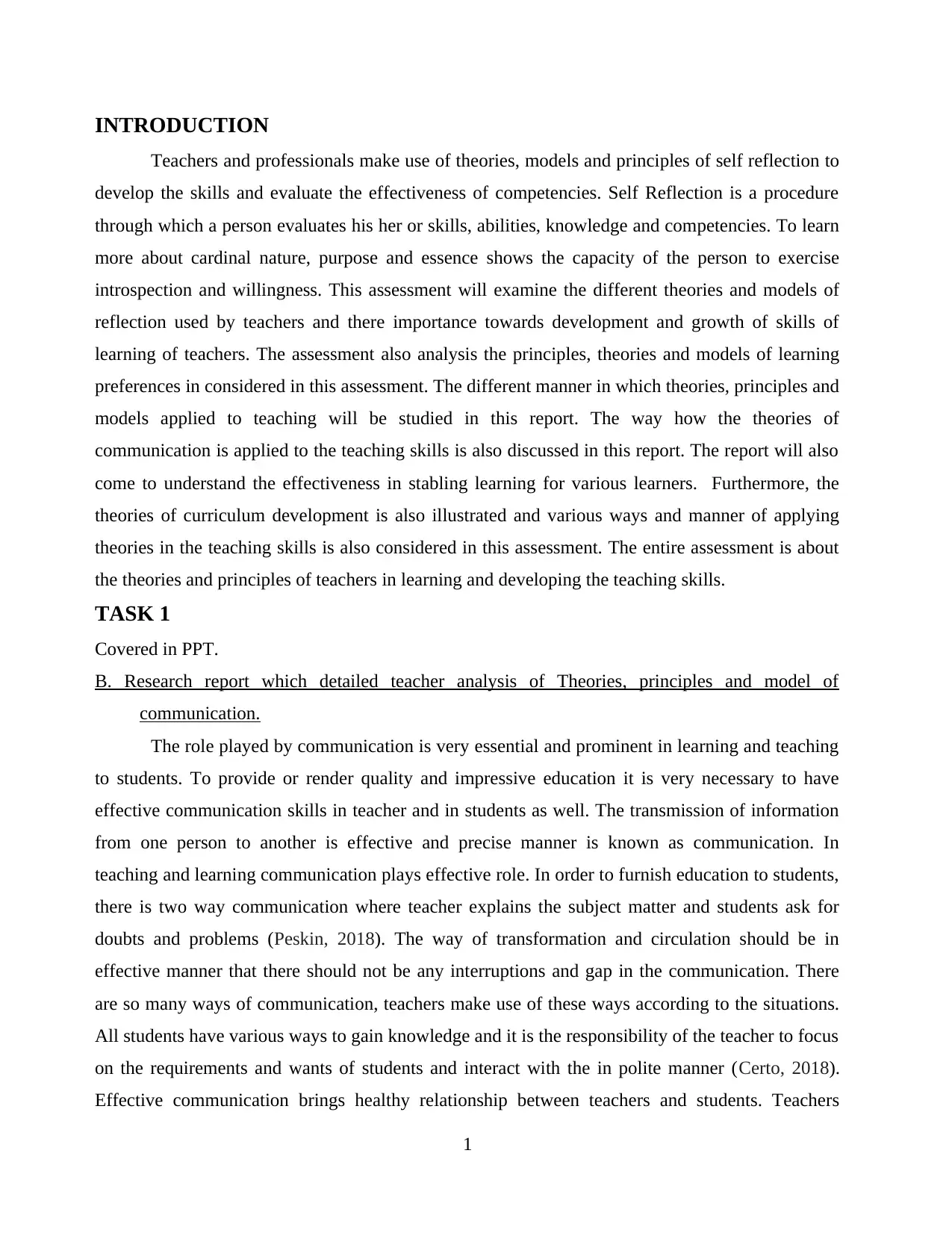
INTRODUCTION
Teachers and professionals make use of theories, models and principles of self reflection to
develop the skills and evaluate the effectiveness of competencies. Self Reflection is a procedure
through which a person evaluates his her or skills, abilities, knowledge and competencies. To learn
more about cardinal nature, purpose and essence shows the capacity of the person to exercise
introspection and willingness. This assessment will examine the different theories and models of
reflection used by teachers and there importance towards development and growth of skills of
learning of teachers. The assessment also analysis the principles, theories and models of learning
preferences in considered in this assessment. The different manner in which theories, principles and
models applied to teaching will be studied in this report. The way how the theories of
communication is applied to the teaching skills is also discussed in this report. The report will also
come to understand the effectiveness in stabling learning for various learners. Furthermore, the
theories of curriculum development is also illustrated and various ways and manner of applying
theories in the teaching skills is also considered in this assessment. The entire assessment is about
the theories and principles of teachers in learning and developing the teaching skills.
TASK 1
Covered in PPT.
B. Research report which detailed teacher analysis of Theories, principles and model of
communication.
The role played by communication is very essential and prominent in learning and teaching
to students. To provide or render quality and impressive education it is very necessary to have
effective communication skills in teacher and in students as well. The transmission of information
from one person to another is effective and precise manner is known as communication. In
teaching and learning communication plays effective role. In order to furnish education to students,
there is two way communication where teacher explains the subject matter and students ask for
doubts and problems (Peskin, 2018). The way of transformation and circulation should be in
effective manner that there should not be any interruptions and gap in the communication. There
are so many ways of communication, teachers make use of these ways according to the situations.
All students have various ways to gain knowledge and it is the responsibility of the teacher to focus
on the requirements and wants of students and interact with the in polite manner (Certo, 2018).
Effective communication brings healthy relationship between teachers and students. Teachers
1
Teachers and professionals make use of theories, models and principles of self reflection to
develop the skills and evaluate the effectiveness of competencies. Self Reflection is a procedure
through which a person evaluates his her or skills, abilities, knowledge and competencies. To learn
more about cardinal nature, purpose and essence shows the capacity of the person to exercise
introspection and willingness. This assessment will examine the different theories and models of
reflection used by teachers and there importance towards development and growth of skills of
learning of teachers. The assessment also analysis the principles, theories and models of learning
preferences in considered in this assessment. The different manner in which theories, principles and
models applied to teaching will be studied in this report. The way how the theories of
communication is applied to the teaching skills is also discussed in this report. The report will also
come to understand the effectiveness in stabling learning for various learners. Furthermore, the
theories of curriculum development is also illustrated and various ways and manner of applying
theories in the teaching skills is also considered in this assessment. The entire assessment is about
the theories and principles of teachers in learning and developing the teaching skills.
TASK 1
Covered in PPT.
B. Research report which detailed teacher analysis of Theories, principles and model of
communication.
The role played by communication is very essential and prominent in learning and teaching
to students. To provide or render quality and impressive education it is very necessary to have
effective communication skills in teacher and in students as well. The transmission of information
from one person to another is effective and precise manner is known as communication. In
teaching and learning communication plays effective role. In order to furnish education to students,
there is two way communication where teacher explains the subject matter and students ask for
doubts and problems (Peskin, 2018). The way of transformation and circulation should be in
effective manner that there should not be any interruptions and gap in the communication. There
are so many ways of communication, teachers make use of these ways according to the situations.
All students have various ways to gain knowledge and it is the responsibility of the teacher to focus
on the requirements and wants of students and interact with the in polite manner (Certo, 2018).
Effective communication brings healthy relationship between teachers and students. Teachers
1
⊘ This is a preview!⊘
Do you want full access?
Subscribe today to unlock all pages.

Trusted by 1+ million students worldwide
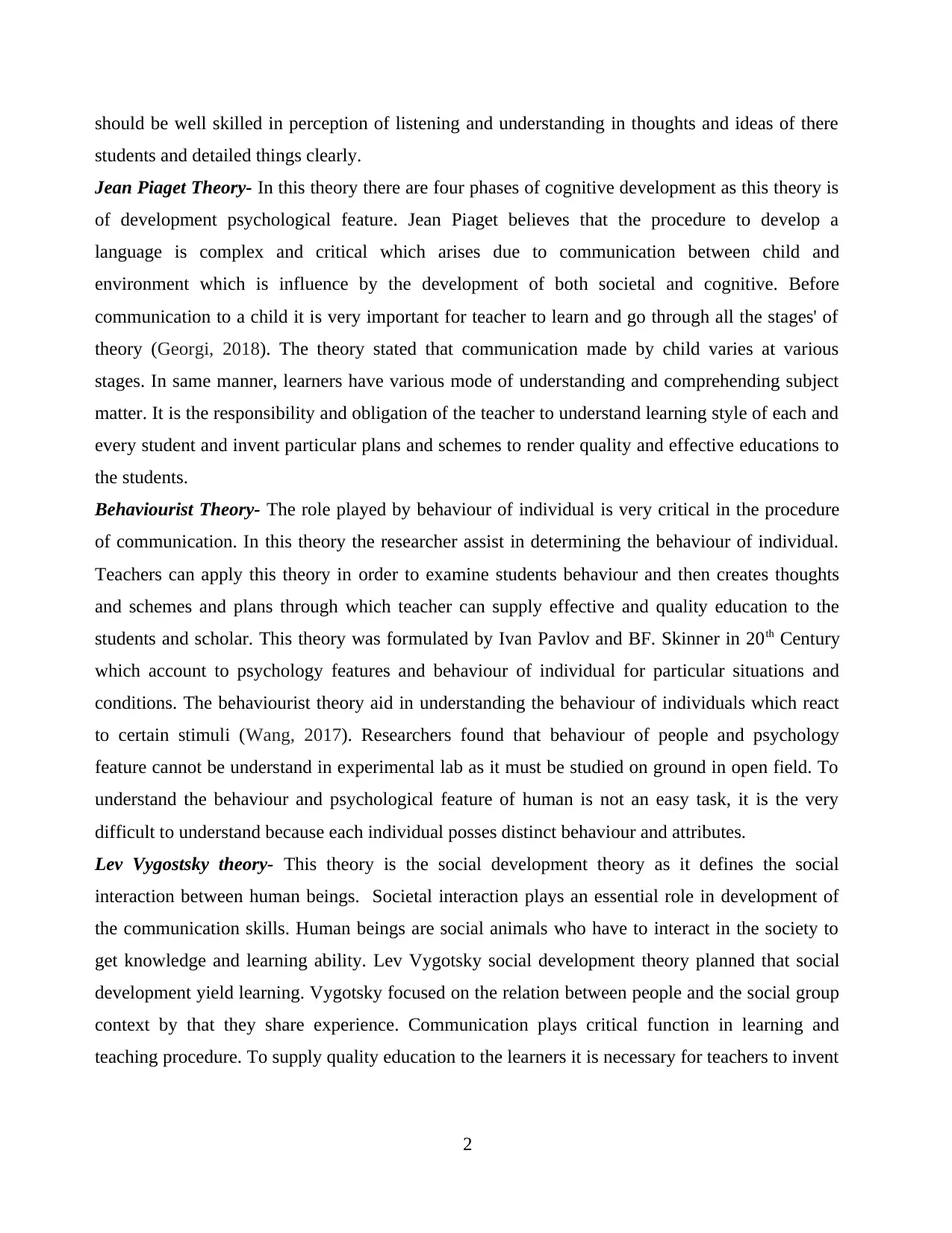
should be well skilled in perception of listening and understanding in thoughts and ideas of there
students and detailed things clearly.
Jean Piaget Theory- In this theory there are four phases of cognitive development as this theory is
of development psychological feature. Jean Piaget believes that the procedure to develop a
language is complex and critical which arises due to communication between child and
environment which is influence by the development of both societal and cognitive. Before
communication to a child it is very important for teacher to learn and go through all the stages' of
theory (Georgi, 2018). The theory stated that communication made by child varies at various
stages. In same manner, learners have various mode of understanding and comprehending subject
matter. It is the responsibility and obligation of the teacher to understand learning style of each and
every student and invent particular plans and schemes to render quality and effective educations to
the students.
Behaviourist Theory- The role played by behaviour of individual is very critical in the procedure
of communication. In this theory the researcher assist in determining the behaviour of individual.
Teachers can apply this theory in order to examine students behaviour and then creates thoughts
and schemes and plans through which teacher can supply effective and quality education to the
students and scholar. This theory was formulated by Ivan Pavlov and BF. Skinner in 20th Century
which account to psychology features and behaviour of individual for particular situations and
conditions. The behaviourist theory aid in understanding the behaviour of individuals which react
to certain stimuli (Wang, 2017). Researchers found that behaviour of people and psychology
feature cannot be understand in experimental lab as it must be studied on ground in open field. To
understand the behaviour and psychological feature of human is not an easy task, it is the very
difficult to understand because each individual posses distinct behaviour and attributes.
Lev Vygostsky theory- This theory is the social development theory as it defines the social
interaction between human beings. Societal interaction plays an essential role in development of
the communication skills. Human beings are social animals who have to interact in the society to
get knowledge and learning ability. Lev Vygotsky social development theory planned that social
development yield learning. Vygotsky focused on the relation between people and the social group
context by that they share experience. Communication plays critical function in learning and
teaching procedure. To supply quality education to the learners it is necessary for teachers to invent
2
students and detailed things clearly.
Jean Piaget Theory- In this theory there are four phases of cognitive development as this theory is
of development psychological feature. Jean Piaget believes that the procedure to develop a
language is complex and critical which arises due to communication between child and
environment which is influence by the development of both societal and cognitive. Before
communication to a child it is very important for teacher to learn and go through all the stages' of
theory (Georgi, 2018). The theory stated that communication made by child varies at various
stages. In same manner, learners have various mode of understanding and comprehending subject
matter. It is the responsibility and obligation of the teacher to understand learning style of each and
every student and invent particular plans and schemes to render quality and effective educations to
the students.
Behaviourist Theory- The role played by behaviour of individual is very critical in the procedure
of communication. In this theory the researcher assist in determining the behaviour of individual.
Teachers can apply this theory in order to examine students behaviour and then creates thoughts
and schemes and plans through which teacher can supply effective and quality education to the
students and scholar. This theory was formulated by Ivan Pavlov and BF. Skinner in 20th Century
which account to psychology features and behaviour of individual for particular situations and
conditions. The behaviourist theory aid in understanding the behaviour of individuals which react
to certain stimuli (Wang, 2017). Researchers found that behaviour of people and psychology
feature cannot be understand in experimental lab as it must be studied on ground in open field. To
understand the behaviour and psychological feature of human is not an easy task, it is the very
difficult to understand because each individual posses distinct behaviour and attributes.
Lev Vygostsky theory- This theory is the social development theory as it defines the social
interaction between human beings. Societal interaction plays an essential role in development of
the communication skills. Human beings are social animals who have to interact in the society to
get knowledge and learning ability. Lev Vygotsky social development theory planned that social
development yield learning. Vygotsky focused on the relation between people and the social group
context by that they share experience. Communication plays critical function in learning and
teaching procedure. To supply quality education to the learners it is necessary for teachers to invent
2
Paraphrase This Document
Need a fresh take? Get an instant paraphrase of this document with our AI Paraphraser
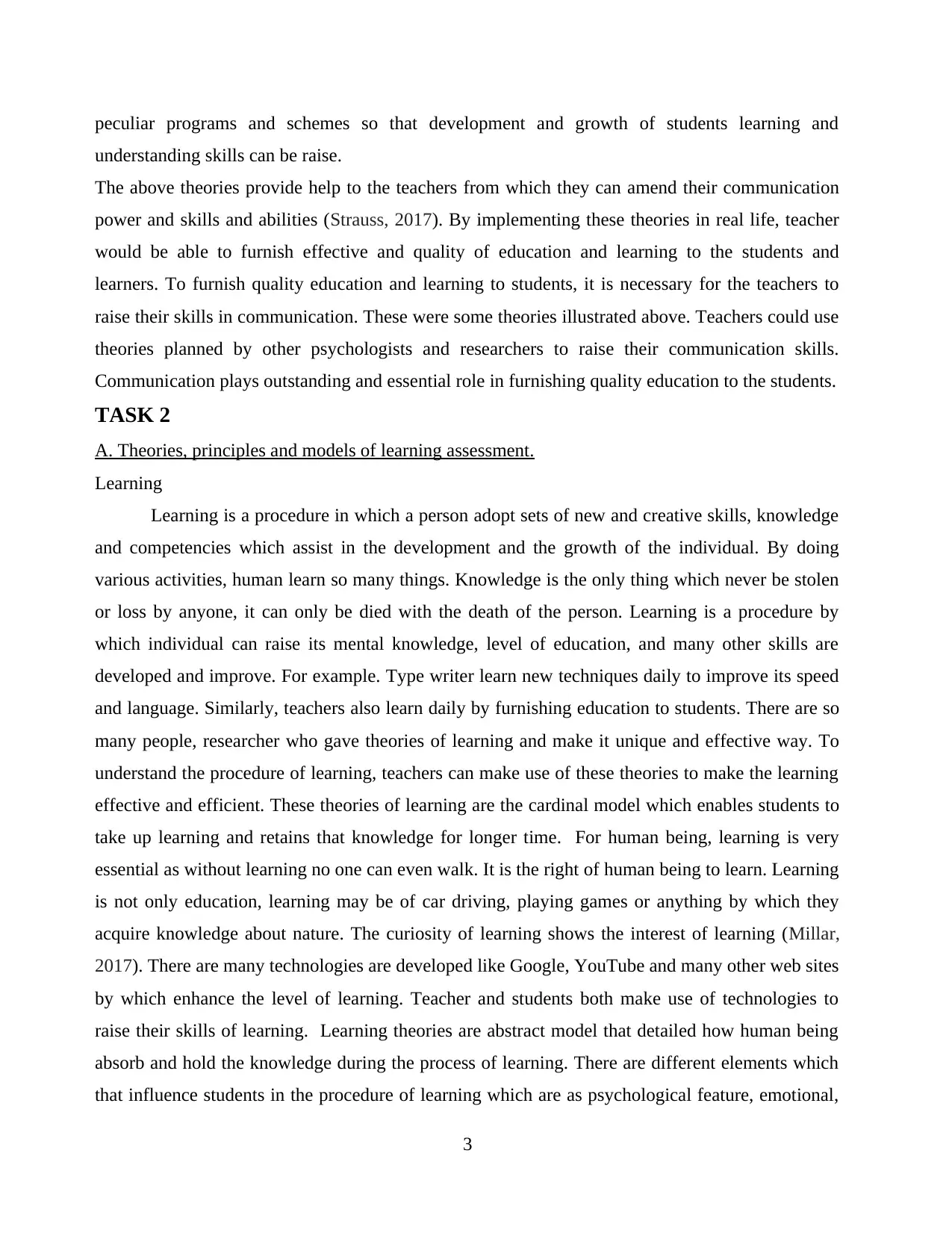
peculiar programs and schemes so that development and growth of students learning and
understanding skills can be raise.
The above theories provide help to the teachers from which they can amend their communication
power and skills and abilities (Strauss, 2017). By implementing these theories in real life, teacher
would be able to furnish effective and quality of education and learning to the students and
learners. To furnish quality education and learning to students, it is necessary for the teachers to
raise their skills in communication. These were some theories illustrated above. Teachers could use
theories planned by other psychologists and researchers to raise their communication skills.
Communication plays outstanding and essential role in furnishing quality education to the students.
TASK 2
A. Theories, principles and models of learning assessment.
Learning
Learning is a procedure in which a person adopt sets of new and creative skills, knowledge
and competencies which assist in the development and the growth of the individual. By doing
various activities, human learn so many things. Knowledge is the only thing which never be stolen
or loss by anyone, it can only be died with the death of the person. Learning is a procedure by
which individual can raise its mental knowledge, level of education, and many other skills are
developed and improve. For example. Type writer learn new techniques daily to improve its speed
and language. Similarly, teachers also learn daily by furnishing education to students. There are so
many people, researcher who gave theories of learning and make it unique and effective way. To
understand the procedure of learning, teachers can make use of these theories to make the learning
effective and efficient. These theories of learning are the cardinal model which enables students to
take up learning and retains that knowledge for longer time. For human being, learning is very
essential as without learning no one can even walk. It is the right of human being to learn. Learning
is not only education, learning may be of car driving, playing games or anything by which they
acquire knowledge about nature. The curiosity of learning shows the interest of learning (Millar,
2017). There are many technologies are developed like Google, YouTube and many other web sites
by which enhance the level of learning. Teacher and students both make use of technologies to
raise their skills of learning. Learning theories are abstract model that detailed how human being
absorb and hold the knowledge during the process of learning. There are different elements which
that influence students in the procedure of learning which are as psychological feature, emotional,
3
understanding skills can be raise.
The above theories provide help to the teachers from which they can amend their communication
power and skills and abilities (Strauss, 2017). By implementing these theories in real life, teacher
would be able to furnish effective and quality of education and learning to the students and
learners. To furnish quality education and learning to students, it is necessary for the teachers to
raise their skills in communication. These were some theories illustrated above. Teachers could use
theories planned by other psychologists and researchers to raise their communication skills.
Communication plays outstanding and essential role in furnishing quality education to the students.
TASK 2
A. Theories, principles and models of learning assessment.
Learning
Learning is a procedure in which a person adopt sets of new and creative skills, knowledge
and competencies which assist in the development and the growth of the individual. By doing
various activities, human learn so many things. Knowledge is the only thing which never be stolen
or loss by anyone, it can only be died with the death of the person. Learning is a procedure by
which individual can raise its mental knowledge, level of education, and many other skills are
developed and improve. For example. Type writer learn new techniques daily to improve its speed
and language. Similarly, teachers also learn daily by furnishing education to students. There are so
many people, researcher who gave theories of learning and make it unique and effective way. To
understand the procedure of learning, teachers can make use of these theories to make the learning
effective and efficient. These theories of learning are the cardinal model which enables students to
take up learning and retains that knowledge for longer time. For human being, learning is very
essential as without learning no one can even walk. It is the right of human being to learn. Learning
is not only education, learning may be of car driving, playing games or anything by which they
acquire knowledge about nature. The curiosity of learning shows the interest of learning (Millar,
2017). There are many technologies are developed like Google, YouTube and many other web sites
by which enhance the level of learning. Teacher and students both make use of technologies to
raise their skills of learning. Learning theories are abstract model that detailed how human being
absorb and hold the knowledge during the process of learning. There are different elements which
that influence students in the procedure of learning which are as psychological feature, emotional,
3
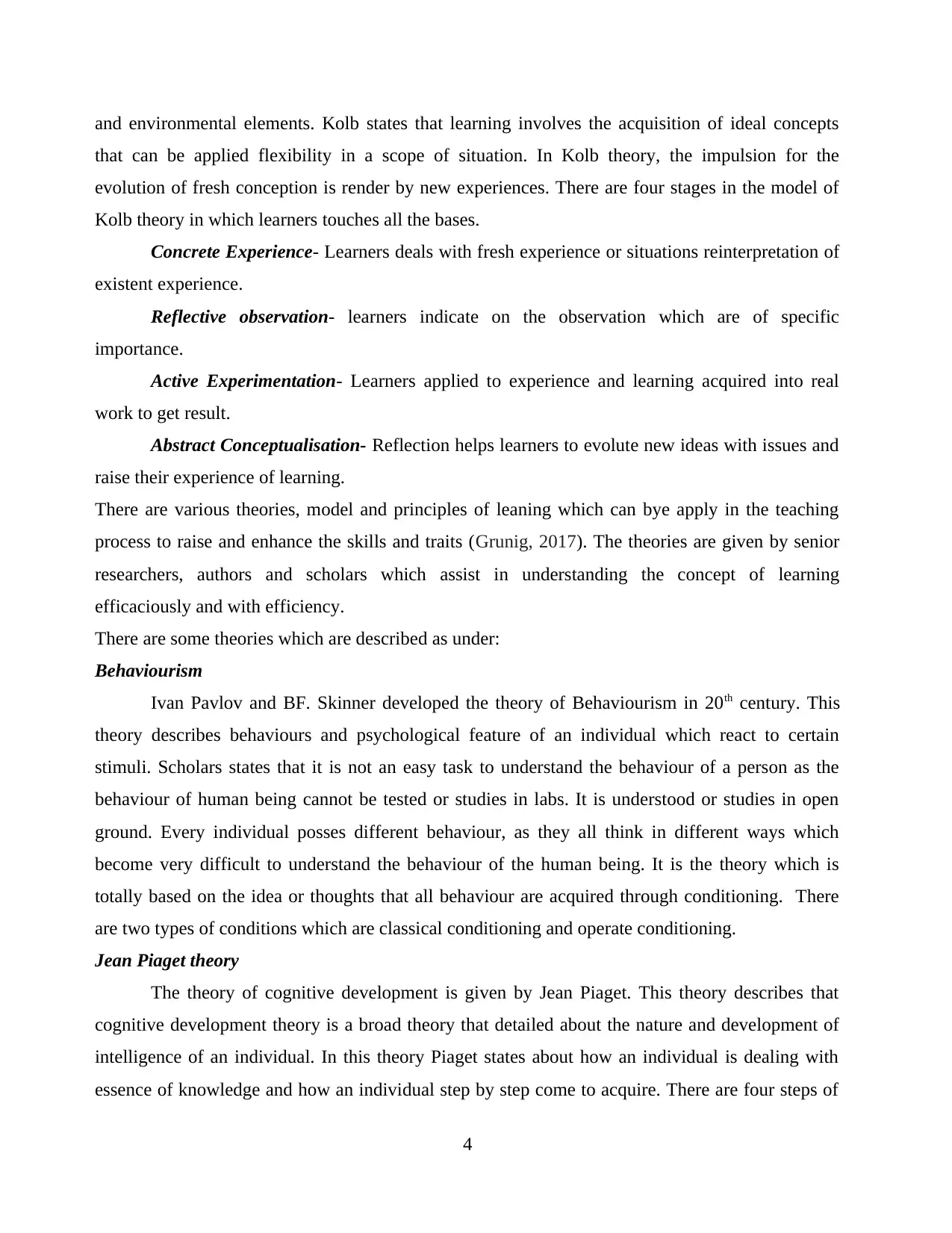
and environmental elements. Kolb states that learning involves the acquisition of ideal concepts
that can be applied flexibility in a scope of situation. In Kolb theory, the impulsion for the
evolution of fresh conception is render by new experiences. There are four stages in the model of
Kolb theory in which learners touches all the bases.
Concrete Experience- Learners deals with fresh experience or situations reinterpretation of
existent experience.
Reflective observation- learners indicate on the observation which are of specific
importance.
Active Experimentation- Learners applied to experience and learning acquired into real
work to get result.
Abstract Conceptualisation- Reflection helps learners to evolute new ideas with issues and
raise their experience of learning.
There are various theories, model and principles of leaning which can bye apply in the teaching
process to raise and enhance the skills and traits (Grunig, 2017). The theories are given by senior
researchers, authors and scholars which assist in understanding the concept of learning
efficaciously and with efficiency.
There are some theories which are described as under:
Behaviourism
Ivan Pavlov and BF. Skinner developed the theory of Behaviourism in 20th century. This
theory describes behaviours and psychological feature of an individual which react to certain
stimuli. Scholars states that it is not an easy task to understand the behaviour of a person as the
behaviour of human being cannot be tested or studies in labs. It is understood or studies in open
ground. Every individual posses different behaviour, as they all think in different ways which
become very difficult to understand the behaviour of the human being. It is the theory which is
totally based on the idea or thoughts that all behaviour are acquired through conditioning. There
are two types of conditions which are classical conditioning and operate conditioning.
Jean Piaget theory
The theory of cognitive development is given by Jean Piaget. This theory describes that
cognitive development theory is a broad theory that detailed about the nature and development of
intelligence of an individual. In this theory Piaget states about how an individual is dealing with
essence of knowledge and how an individual step by step come to acquire. There are four steps of
4
that can be applied flexibility in a scope of situation. In Kolb theory, the impulsion for the
evolution of fresh conception is render by new experiences. There are four stages in the model of
Kolb theory in which learners touches all the bases.
Concrete Experience- Learners deals with fresh experience or situations reinterpretation of
existent experience.
Reflective observation- learners indicate on the observation which are of specific
importance.
Active Experimentation- Learners applied to experience and learning acquired into real
work to get result.
Abstract Conceptualisation- Reflection helps learners to evolute new ideas with issues and
raise their experience of learning.
There are various theories, model and principles of leaning which can bye apply in the teaching
process to raise and enhance the skills and traits (Grunig, 2017). The theories are given by senior
researchers, authors and scholars which assist in understanding the concept of learning
efficaciously and with efficiency.
There are some theories which are described as under:
Behaviourism
Ivan Pavlov and BF. Skinner developed the theory of Behaviourism in 20th century. This
theory describes behaviours and psychological feature of an individual which react to certain
stimuli. Scholars states that it is not an easy task to understand the behaviour of a person as the
behaviour of human being cannot be tested or studies in labs. It is understood or studies in open
ground. Every individual posses different behaviour, as they all think in different ways which
become very difficult to understand the behaviour of the human being. It is the theory which is
totally based on the idea or thoughts that all behaviour are acquired through conditioning. There
are two types of conditions which are classical conditioning and operate conditioning.
Jean Piaget theory
The theory of cognitive development is given by Jean Piaget. This theory describes that
cognitive development theory is a broad theory that detailed about the nature and development of
intelligence of an individual. In this theory Piaget states about how an individual is dealing with
essence of knowledge and how an individual step by step come to acquire. There are four steps of
4
⊘ This is a preview!⊘
Do you want full access?
Subscribe today to unlock all pages.

Trusted by 1+ million students worldwide
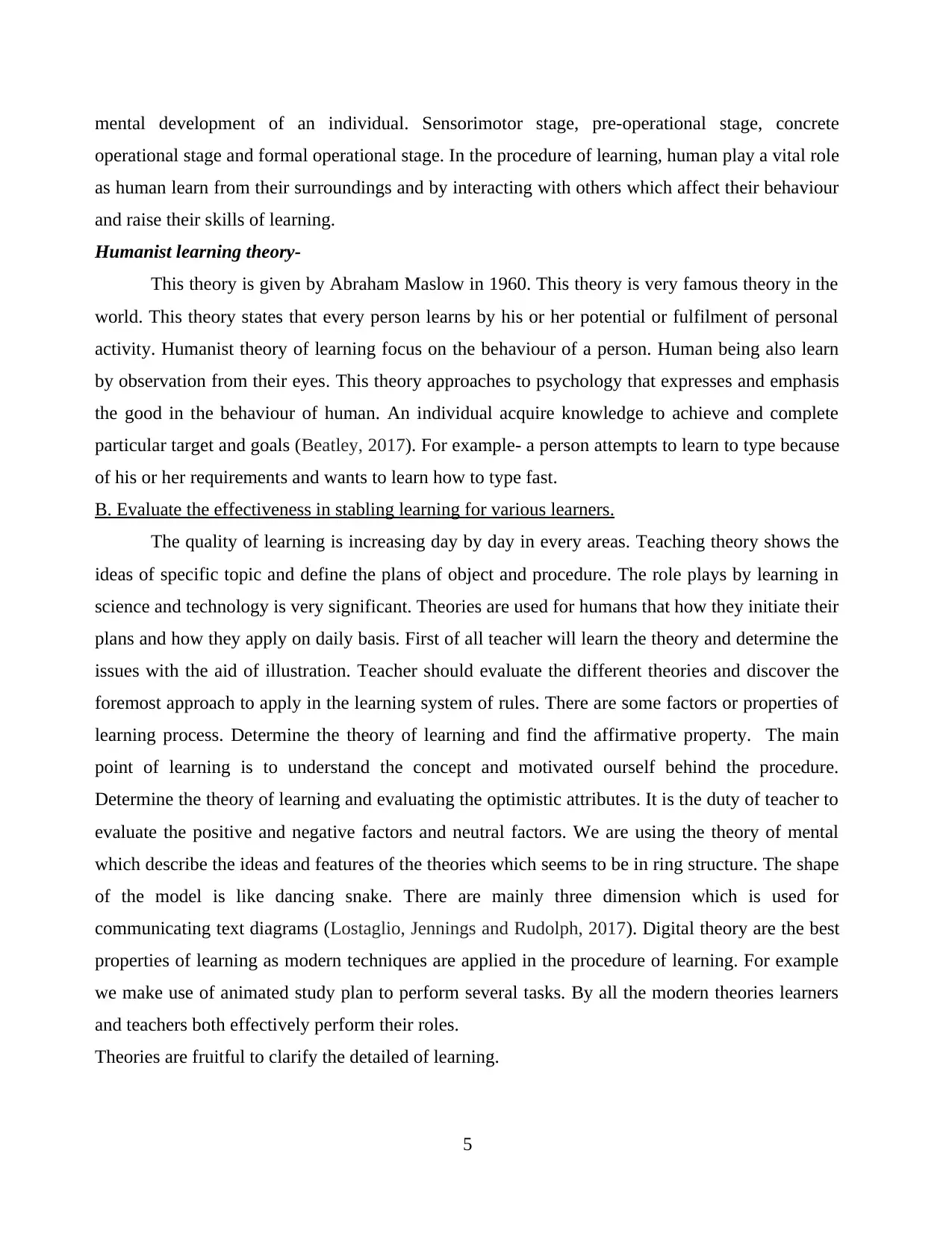
mental development of an individual. Sensorimotor stage, pre-operational stage, concrete
operational stage and formal operational stage. In the procedure of learning, human play a vital role
as human learn from their surroundings and by interacting with others which affect their behaviour
and raise their skills of learning.
Humanist learning theory-
This theory is given by Abraham Maslow in 1960. This theory is very famous theory in the
world. This theory states that every person learns by his or her potential or fulfilment of personal
activity. Humanist theory of learning focus on the behaviour of a person. Human being also learn
by observation from their eyes. This theory approaches to psychology that expresses and emphasis
the good in the behaviour of human. An individual acquire knowledge to achieve and complete
particular target and goals (Beatley, 2017). For example- a person attempts to learn to type because
of his or her requirements and wants to learn how to type fast.
B. Evaluate the effectiveness in stabling learning for various learners.
The quality of learning is increasing day by day in every areas. Teaching theory shows the
ideas of specific topic and define the plans of object and procedure. The role plays by learning in
science and technology is very significant. Theories are used for humans that how they initiate their
plans and how they apply on daily basis. First of all teacher will learn the theory and determine the
issues with the aid of illustration. Teacher should evaluate the different theories and discover the
foremost approach to apply in the learning system of rules. There are some factors or properties of
learning process. Determine the theory of learning and find the affirmative property. The main
point of learning is to understand the concept and motivated ourself behind the procedure.
Determine the theory of learning and evaluating the optimistic attributes. It is the duty of teacher to
evaluate the positive and negative factors and neutral factors. We are using the theory of mental
which describe the ideas and features of the theories which seems to be in ring structure. The shape
of the model is like dancing snake. There are mainly three dimension which is used for
communicating text diagrams (Lostaglio, Jennings and Rudolph, 2017). Digital theory are the best
properties of learning as modern techniques are applied in the procedure of learning. For example
we make use of animated study plan to perform several tasks. By all the modern theories learners
and teachers both effectively perform their roles.
Theories are fruitful to clarify the detailed of learning.
5
operational stage and formal operational stage. In the procedure of learning, human play a vital role
as human learn from their surroundings and by interacting with others which affect their behaviour
and raise their skills of learning.
Humanist learning theory-
This theory is given by Abraham Maslow in 1960. This theory is very famous theory in the
world. This theory states that every person learns by his or her potential or fulfilment of personal
activity. Humanist theory of learning focus on the behaviour of a person. Human being also learn
by observation from their eyes. This theory approaches to psychology that expresses and emphasis
the good in the behaviour of human. An individual acquire knowledge to achieve and complete
particular target and goals (Beatley, 2017). For example- a person attempts to learn to type because
of his or her requirements and wants to learn how to type fast.
B. Evaluate the effectiveness in stabling learning for various learners.
The quality of learning is increasing day by day in every areas. Teaching theory shows the
ideas of specific topic and define the plans of object and procedure. The role plays by learning in
science and technology is very significant. Theories are used for humans that how they initiate their
plans and how they apply on daily basis. First of all teacher will learn the theory and determine the
issues with the aid of illustration. Teacher should evaluate the different theories and discover the
foremost approach to apply in the learning system of rules. There are some factors or properties of
learning process. Determine the theory of learning and find the affirmative property. The main
point of learning is to understand the concept and motivated ourself behind the procedure.
Determine the theory of learning and evaluating the optimistic attributes. It is the duty of teacher to
evaluate the positive and negative factors and neutral factors. We are using the theory of mental
which describe the ideas and features of the theories which seems to be in ring structure. The shape
of the model is like dancing snake. There are mainly three dimension which is used for
communicating text diagrams (Lostaglio, Jennings and Rudolph, 2017). Digital theory are the best
properties of learning as modern techniques are applied in the procedure of learning. For example
we make use of animated study plan to perform several tasks. By all the modern theories learners
and teachers both effectively perform their roles.
Theories are fruitful to clarify the detailed of learning.
5
Paraphrase This Document
Need a fresh take? Get an instant paraphrase of this document with our AI Paraphraser
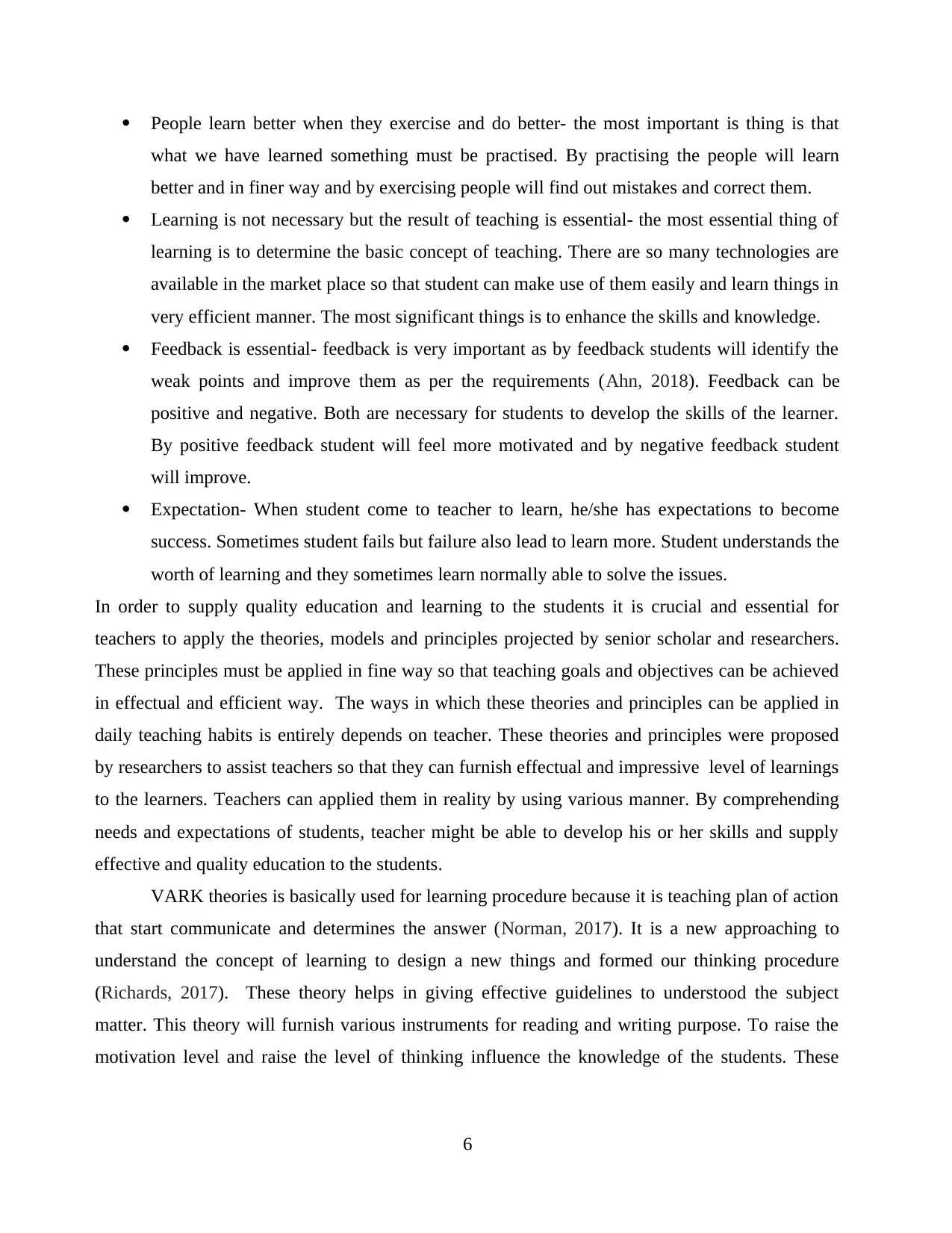
People learn better when they exercise and do better- the most important is thing is that
what we have learned something must be practised. By practising the people will learn
better and in finer way and by exercising people will find out mistakes and correct them.
Learning is not necessary but the result of teaching is essential- the most essential thing of
learning is to determine the basic concept of teaching. There are so many technologies are
available in the market place so that student can make use of them easily and learn things in
very efficient manner. The most significant things is to enhance the skills and knowledge.
Feedback is essential- feedback is very important as by feedback students will identify the
weak points and improve them as per the requirements (Ahn, 2018). Feedback can be
positive and negative. Both are necessary for students to develop the skills of the learner.
By positive feedback student will feel more motivated and by negative feedback student
will improve.
Expectation- When student come to teacher to learn, he/she has expectations to become
success. Sometimes student fails but failure also lead to learn more. Student understands the
worth of learning and they sometimes learn normally able to solve the issues.
In order to supply quality education and learning to the students it is crucial and essential for
teachers to apply the theories, models and principles projected by senior scholar and researchers.
These principles must be applied in fine way so that teaching goals and objectives can be achieved
in effectual and efficient way. The ways in which these theories and principles can be applied in
daily teaching habits is entirely depends on teacher. These theories and principles were proposed
by researchers to assist teachers so that they can furnish effectual and impressive level of learnings
to the learners. Teachers can applied them in reality by using various manner. By comprehending
needs and expectations of students, teacher might be able to develop his or her skills and supply
effective and quality education to the students.
VARK theories is basically used for learning procedure because it is teaching plan of action
that start communicate and determines the answer (Norman, 2017). It is a new approaching to
understand the concept of learning to design a new things and formed our thinking procedure
(Richards, 2017). These theory helps in giving effective guidelines to understood the subject
matter. This theory will furnish various instruments for reading and writing purpose. To raise the
motivation level and raise the level of thinking influence the knowledge of the students. These
6
what we have learned something must be practised. By practising the people will learn
better and in finer way and by exercising people will find out mistakes and correct them.
Learning is not necessary but the result of teaching is essential- the most essential thing of
learning is to determine the basic concept of teaching. There are so many technologies are
available in the market place so that student can make use of them easily and learn things in
very efficient manner. The most significant things is to enhance the skills and knowledge.
Feedback is essential- feedback is very important as by feedback students will identify the
weak points and improve them as per the requirements (Ahn, 2018). Feedback can be
positive and negative. Both are necessary for students to develop the skills of the learner.
By positive feedback student will feel more motivated and by negative feedback student
will improve.
Expectation- When student come to teacher to learn, he/she has expectations to become
success. Sometimes student fails but failure also lead to learn more. Student understands the
worth of learning and they sometimes learn normally able to solve the issues.
In order to supply quality education and learning to the students it is crucial and essential for
teachers to apply the theories, models and principles projected by senior scholar and researchers.
These principles must be applied in fine way so that teaching goals and objectives can be achieved
in effectual and efficient way. The ways in which these theories and principles can be applied in
daily teaching habits is entirely depends on teacher. These theories and principles were proposed
by researchers to assist teachers so that they can furnish effectual and impressive level of learnings
to the learners. Teachers can applied them in reality by using various manner. By comprehending
needs and expectations of students, teacher might be able to develop his or her skills and supply
effective and quality education to the students.
VARK theories is basically used for learning procedure because it is teaching plan of action
that start communicate and determines the answer (Norman, 2017). It is a new approaching to
understand the concept of learning to design a new things and formed our thinking procedure
(Richards, 2017). These theory helps in giving effective guidelines to understood the subject
matter. This theory will furnish various instruments for reading and writing purpose. To raise the
motivation level and raise the level of thinking influence the knowledge of the students. These
6
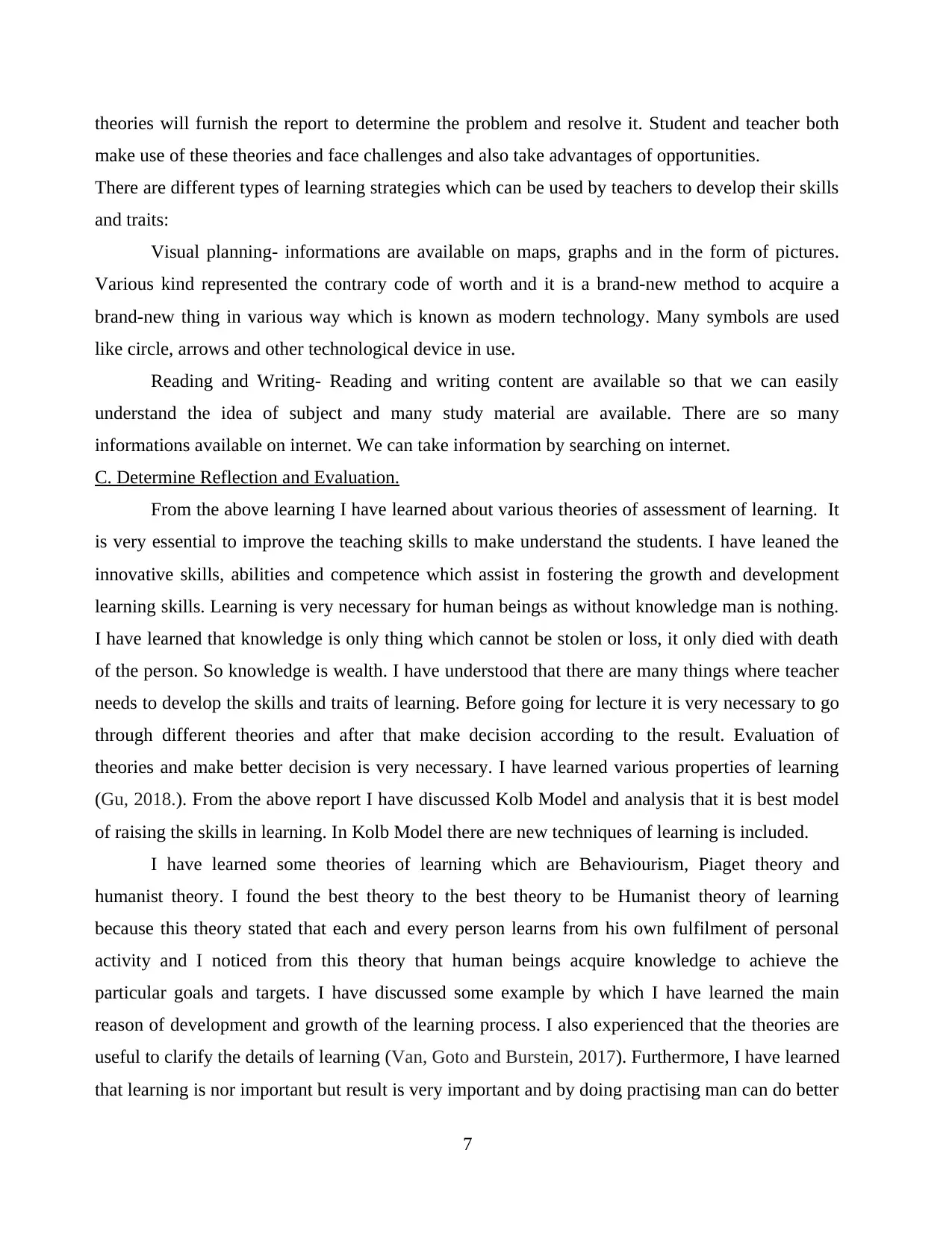
theories will furnish the report to determine the problem and resolve it. Student and teacher both
make use of these theories and face challenges and also take advantages of opportunities.
There are different types of learning strategies which can be used by teachers to develop their skills
and traits:
Visual planning- informations are available on maps, graphs and in the form of pictures.
Various kind represented the contrary code of worth and it is a brand-new method to acquire a
brand-new thing in various way which is known as modern technology. Many symbols are used
like circle, arrows and other technological device in use.
Reading and Writing- Reading and writing content are available so that we can easily
understand the idea of subject and many study material are available. There are so many
informations available on internet. We can take information by searching on internet.
C. Determine Reflection and Evaluation.
From the above learning I have learned about various theories of assessment of learning. It
is very essential to improve the teaching skills to make understand the students. I have leaned the
innovative skills, abilities and competence which assist in fostering the growth and development
learning skills. Learning is very necessary for human beings as without knowledge man is nothing.
I have learned that knowledge is only thing which cannot be stolen or loss, it only died with death
of the person. So knowledge is wealth. I have understood that there are many things where teacher
needs to develop the skills and traits of learning. Before going for lecture it is very necessary to go
through different theories and after that make decision according to the result. Evaluation of
theories and make better decision is very necessary. I have learned various properties of learning
(Gu, 2018.). From the above report I have discussed Kolb Model and analysis that it is best model
of raising the skills in learning. In Kolb Model there are new techniques of learning is included.
I have learned some theories of learning which are Behaviourism, Piaget theory and
humanist theory. I found the best theory to the best theory to be Humanist theory of learning
because this theory stated that each and every person learns from his own fulfilment of personal
activity and I noticed from this theory that human beings acquire knowledge to achieve the
particular goals and targets. I have discussed some example by which I have learned the main
reason of development and growth of the learning process. I also experienced that the theories are
useful to clarify the details of learning (Van, Goto and Burstein, 2017). Furthermore, I have learned
that learning is nor important but result is very important and by doing practising man can do better
7
make use of these theories and face challenges and also take advantages of opportunities.
There are different types of learning strategies which can be used by teachers to develop their skills
and traits:
Visual planning- informations are available on maps, graphs and in the form of pictures.
Various kind represented the contrary code of worth and it is a brand-new method to acquire a
brand-new thing in various way which is known as modern technology. Many symbols are used
like circle, arrows and other technological device in use.
Reading and Writing- Reading and writing content are available so that we can easily
understand the idea of subject and many study material are available. There are so many
informations available on internet. We can take information by searching on internet.
C. Determine Reflection and Evaluation.
From the above learning I have learned about various theories of assessment of learning. It
is very essential to improve the teaching skills to make understand the students. I have leaned the
innovative skills, abilities and competence which assist in fostering the growth and development
learning skills. Learning is very necessary for human beings as without knowledge man is nothing.
I have learned that knowledge is only thing which cannot be stolen or loss, it only died with death
of the person. So knowledge is wealth. I have understood that there are many things where teacher
needs to develop the skills and traits of learning. Before going for lecture it is very necessary to go
through different theories and after that make decision according to the result. Evaluation of
theories and make better decision is very necessary. I have learned various properties of learning
(Gu, 2018.). From the above report I have discussed Kolb Model and analysis that it is best model
of raising the skills in learning. In Kolb Model there are new techniques of learning is included.
I have learned some theories of learning which are Behaviourism, Piaget theory and
humanist theory. I found the best theory to the best theory to be Humanist theory of learning
because this theory stated that each and every person learns from his own fulfilment of personal
activity and I noticed from this theory that human beings acquire knowledge to achieve the
particular goals and targets. I have discussed some example by which I have learned the main
reason of development and growth of the learning process. I also experienced that the theories are
useful to clarify the details of learning (Van, Goto and Burstein, 2017). Furthermore, I have learned
that learning is nor important but result is very important and by doing practising man can do better
7
⊘ This is a preview!⊘
Do you want full access?
Subscribe today to unlock all pages.

Trusted by 1+ million students worldwide
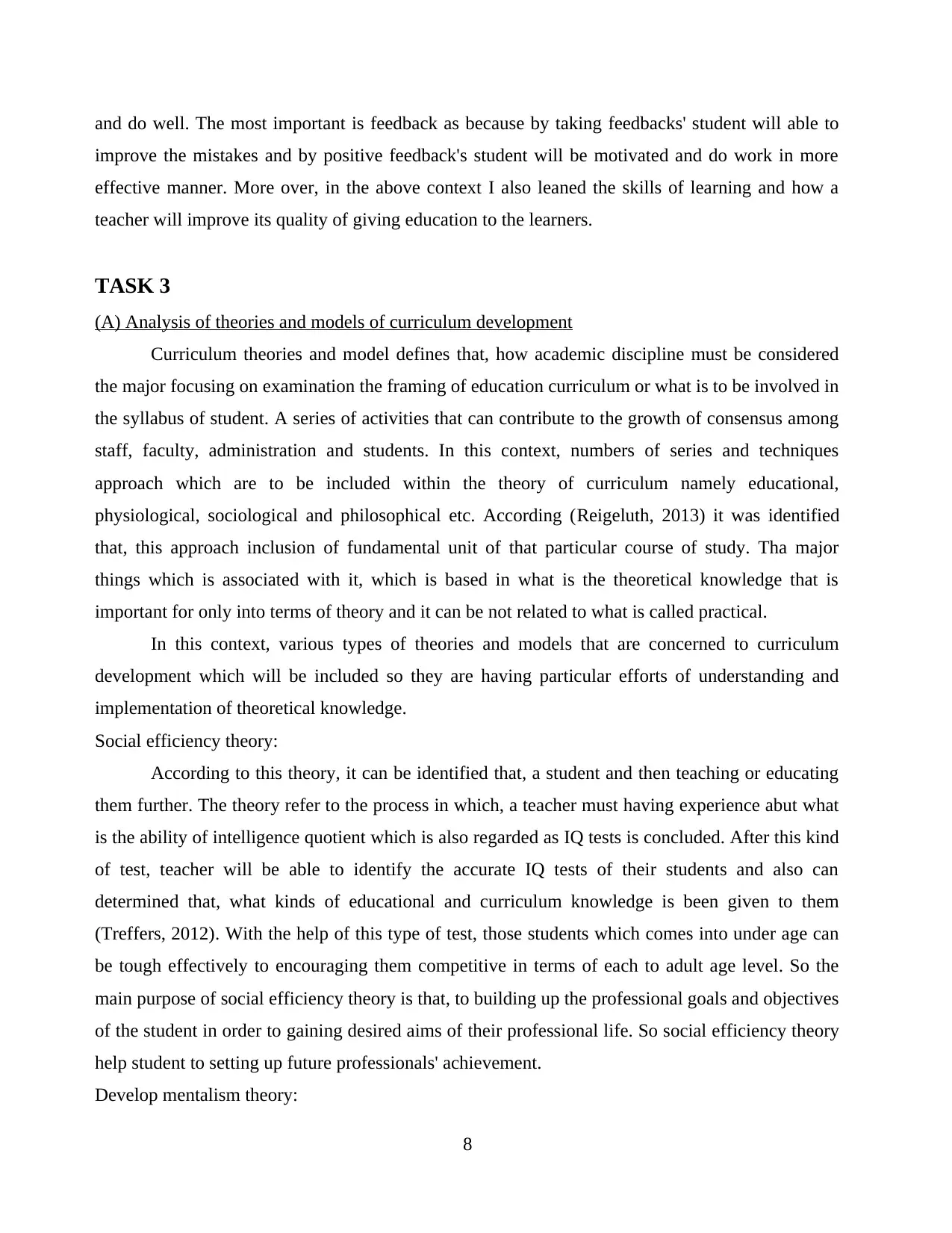
and do well. The most important is feedback as because by taking feedbacks' student will able to
improve the mistakes and by positive feedback's student will be motivated and do work in more
effective manner. More over, in the above context I also leaned the skills of learning and how a
teacher will improve its quality of giving education to the learners.
TASK 3
(A) Analysis of theories and models of curriculum development
Curriculum theories and model defines that, how academic discipline must be considered
the major focusing on examination the framing of education curriculum or what is to be involved in
the syllabus of student. A series of activities that can contribute to the growth of consensus among
staff, faculty, administration and students. In this context, numbers of series and techniques
approach which are to be included within the theory of curriculum namely educational,
physiological, sociological and philosophical etc. According (Reigeluth, 2013) it was identified
that, this approach inclusion of fundamental unit of that particular course of study. Tha major
things which is associated with it, which is based in what is the theoretical knowledge that is
important for only into terms of theory and it can be not related to what is called practical.
In this context, various types of theories and models that are concerned to curriculum
development which will be included so they are having particular efforts of understanding and
implementation of theoretical knowledge.
Social efficiency theory:
According to this theory, it can be identified that, a student and then teaching or educating
them further. The theory refer to the process in which, a teacher must having experience abut what
is the ability of intelligence quotient which is also regarded as IQ tests is concluded. After this kind
of test, teacher will be able to identify the accurate IQ tests of their students and also can
determined that, what kinds of educational and curriculum knowledge is been given to them
(Treffers, 2012). With the help of this type of test, those students which comes into under age can
be tough effectively to encouraging them competitive in terms of each to adult age level. So the
main purpose of social efficiency theory is that, to building up the professional goals and objectives
of the student in order to gaining desired aims of their professional life. So social efficiency theory
help student to setting up future professionals' achievement.
Develop mentalism theory:
8
improve the mistakes and by positive feedback's student will be motivated and do work in more
effective manner. More over, in the above context I also leaned the skills of learning and how a
teacher will improve its quality of giving education to the learners.
TASK 3
(A) Analysis of theories and models of curriculum development
Curriculum theories and model defines that, how academic discipline must be considered
the major focusing on examination the framing of education curriculum or what is to be involved in
the syllabus of student. A series of activities that can contribute to the growth of consensus among
staff, faculty, administration and students. In this context, numbers of series and techniques
approach which are to be included within the theory of curriculum namely educational,
physiological, sociological and philosophical etc. According (Reigeluth, 2013) it was identified
that, this approach inclusion of fundamental unit of that particular course of study. Tha major
things which is associated with it, which is based in what is the theoretical knowledge that is
important for only into terms of theory and it can be not related to what is called practical.
In this context, various types of theories and models that are concerned to curriculum
development which will be included so they are having particular efforts of understanding and
implementation of theoretical knowledge.
Social efficiency theory:
According to this theory, it can be identified that, a student and then teaching or educating
them further. The theory refer to the process in which, a teacher must having experience abut what
is the ability of intelligence quotient which is also regarded as IQ tests is concluded. After this kind
of test, teacher will be able to identify the accurate IQ tests of their students and also can
determined that, what kinds of educational and curriculum knowledge is been given to them
(Treffers, 2012). With the help of this type of test, those students which comes into under age can
be tough effectively to encouraging them competitive in terms of each to adult age level. So the
main purpose of social efficiency theory is that, to building up the professional goals and objectives
of the student in order to gaining desired aims of their professional life. So social efficiency theory
help student to setting up future professionals' achievement.
Develop mentalism theory:
8
Paraphrase This Document
Need a fresh take? Get an instant paraphrase of this document with our AI Paraphraser
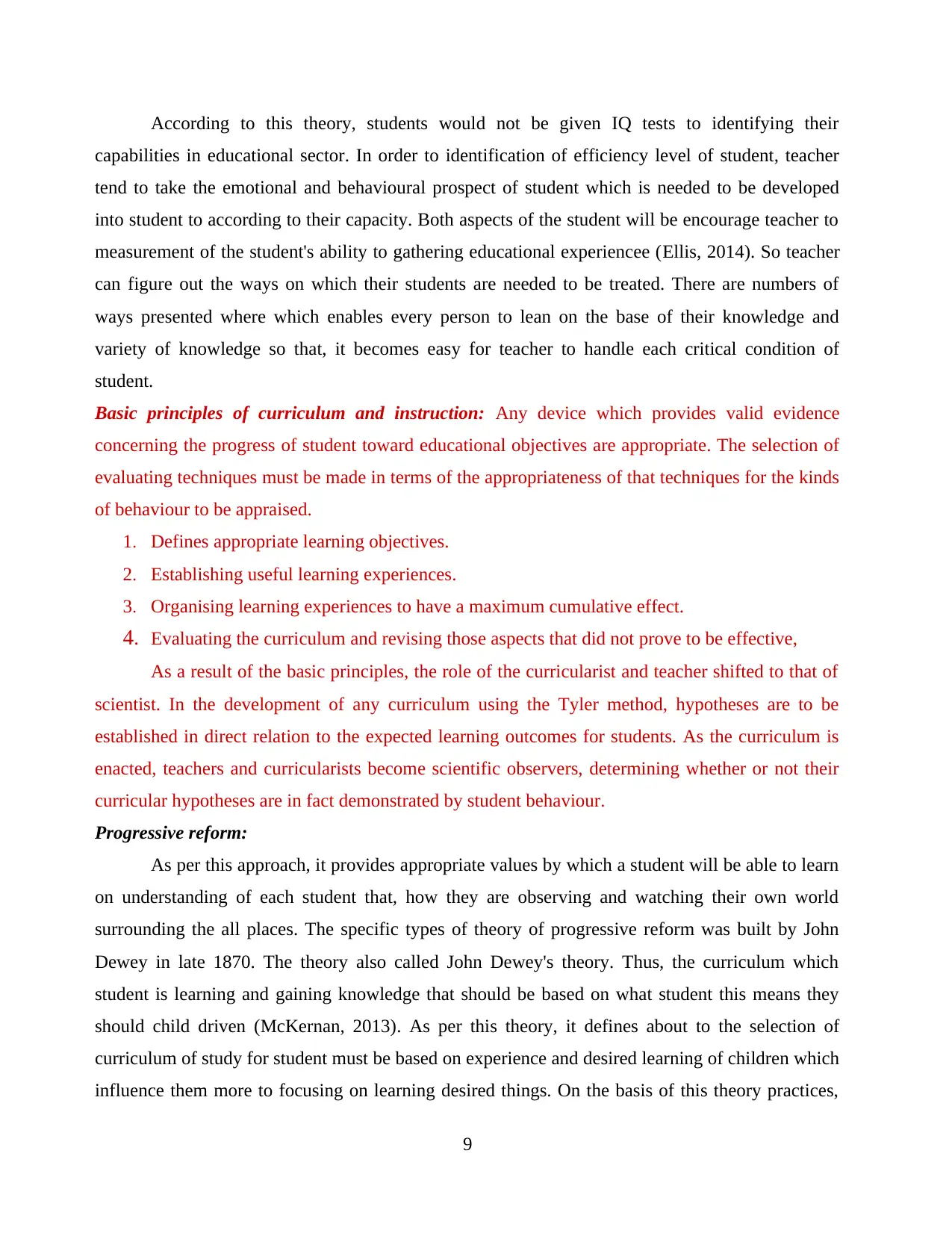
According to this theory, students would not be given IQ tests to identifying their
capabilities in educational sector. In order to identification of efficiency level of student, teacher
tend to take the emotional and behavioural prospect of student which is needed to be developed
into student to according to their capacity. Both aspects of the student will be encourage teacher to
measurement of the student's ability to gathering educational experiencee (Ellis, 2014). So teacher
can figure out the ways on which their students are needed to be treated. There are numbers of
ways presented where which enables every person to lean on the base of their knowledge and
variety of knowledge so that, it becomes easy for teacher to handle each critical condition of
student.
Basic principles of curriculum and instruction: Any device which provides valid evidence
concerning the progress of student toward educational objectives are appropriate. The selection of
evaluating techniques must be made in terms of the appropriateness of that techniques for the kinds
of behaviour to be appraised.
1. Defines appropriate learning objectives.
2. Establishing useful learning experiences.
3. Organising learning experiences to have a maximum cumulative effect.
4. Evaluating the curriculum and revising those aspects that did not prove to be effective,
As a result of the basic principles, the role of the curricularist and teacher shifted to that of
scientist. In the development of any curriculum using the Tyler method, hypotheses are to be
established in direct relation to the expected learning outcomes for students. As the curriculum is
enacted, teachers and curricularists become scientific observers, determining whether or not their
curricular hypotheses are in fact demonstrated by student behaviour.
Progressive reform:
As per this approach, it provides appropriate values by which a student will be able to learn
on understanding of each student that, how they are observing and watching their own world
surrounding the all places. The specific types of theory of progressive reform was built by John
Dewey in late 1870. The theory also called John Dewey's theory. Thus, the curriculum which
student is learning and gaining knowledge that should be based on what student this means they
should child driven (McKernan, 2013). As per this theory, it defines about to the selection of
curriculum of study for student must be based on experience and desired learning of children which
influence them more to focusing on learning desired things. On the basis of this theory practices,
9
capabilities in educational sector. In order to identification of efficiency level of student, teacher
tend to take the emotional and behavioural prospect of student which is needed to be developed
into student to according to their capacity. Both aspects of the student will be encourage teacher to
measurement of the student's ability to gathering educational experiencee (Ellis, 2014). So teacher
can figure out the ways on which their students are needed to be treated. There are numbers of
ways presented where which enables every person to lean on the base of their knowledge and
variety of knowledge so that, it becomes easy for teacher to handle each critical condition of
student.
Basic principles of curriculum and instruction: Any device which provides valid evidence
concerning the progress of student toward educational objectives are appropriate. The selection of
evaluating techniques must be made in terms of the appropriateness of that techniques for the kinds
of behaviour to be appraised.
1. Defines appropriate learning objectives.
2. Establishing useful learning experiences.
3. Organising learning experiences to have a maximum cumulative effect.
4. Evaluating the curriculum and revising those aspects that did not prove to be effective,
As a result of the basic principles, the role of the curricularist and teacher shifted to that of
scientist. In the development of any curriculum using the Tyler method, hypotheses are to be
established in direct relation to the expected learning outcomes for students. As the curriculum is
enacted, teachers and curricularists become scientific observers, determining whether or not their
curricular hypotheses are in fact demonstrated by student behaviour.
Progressive reform:
As per this approach, it provides appropriate values by which a student will be able to learn
on understanding of each student that, how they are observing and watching their own world
surrounding the all places. The specific types of theory of progressive reform was built by John
Dewey in late 1870. The theory also called John Dewey's theory. Thus, the curriculum which
student is learning and gaining knowledge that should be based on what student this means they
should child driven (McKernan, 2013). As per this theory, it defines about to the selection of
curriculum of study for student must be based on experience and desired learning of children which
influence them more to focusing on learning desired things. On the basis of this theory practices,
9
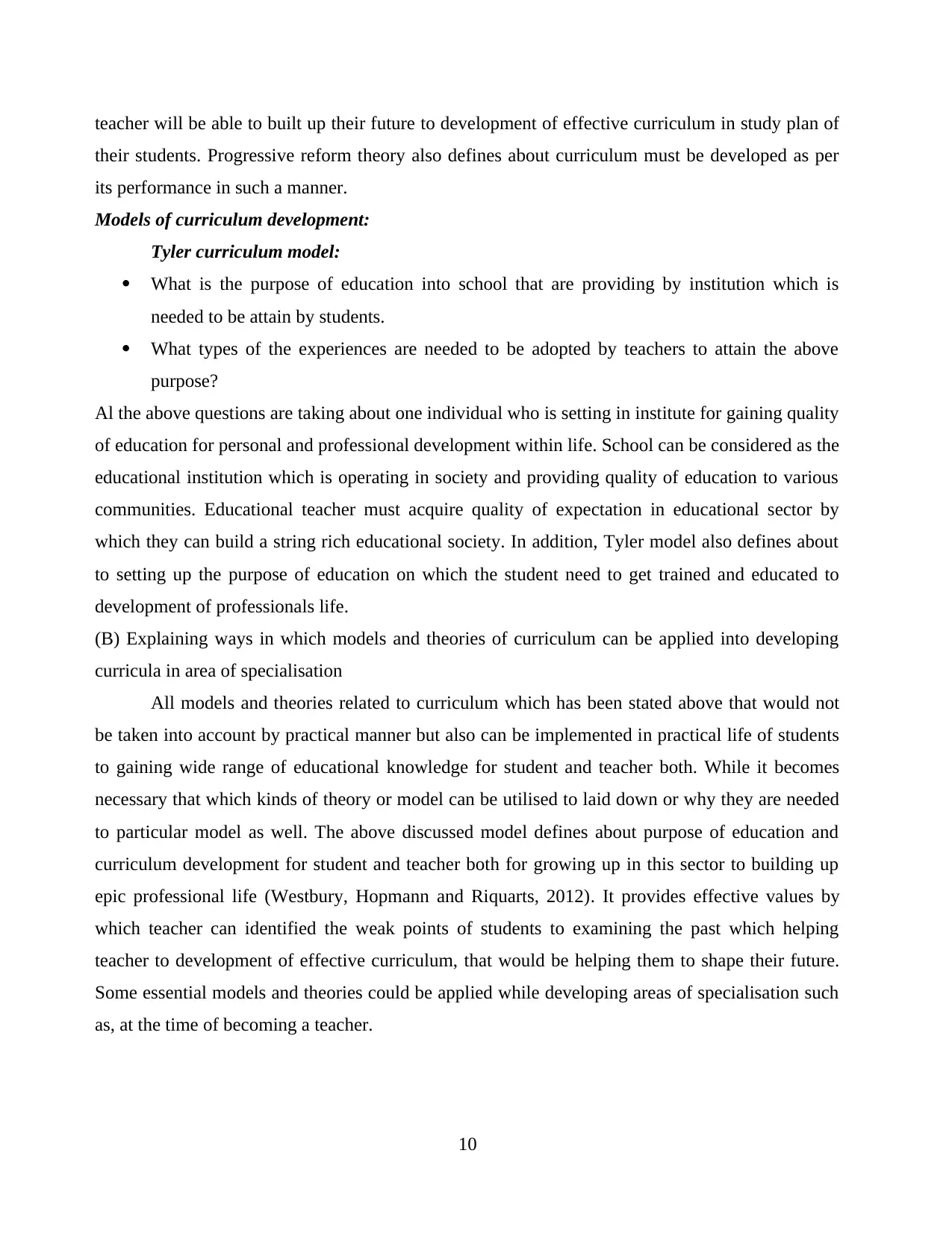
teacher will be able to built up their future to development of effective curriculum in study plan of
their students. Progressive reform theory also defines about curriculum must be developed as per
its performance in such a manner.
Models of curriculum development:
Tyler curriculum model:
What is the purpose of education into school that are providing by institution which is
needed to be attain by students.
What types of the experiences are needed to be adopted by teachers to attain the above
purpose?
Al the above questions are taking about one individual who is setting in institute for gaining quality
of education for personal and professional development within life. School can be considered as the
educational institution which is operating in society and providing quality of education to various
communities. Educational teacher must acquire quality of expectation in educational sector by
which they can build a string rich educational society. In addition, Tyler model also defines about
to setting up the purpose of education on which the student need to get trained and educated to
development of professionals life.
(B) Explaining ways in which models and theories of curriculum can be applied into developing
curricula in area of specialisation
All models and theories related to curriculum which has been stated above that would not
be taken into account by practical manner but also can be implemented in practical life of students
to gaining wide range of educational knowledge for student and teacher both. While it becomes
necessary that which kinds of theory or model can be utilised to laid down or why they are needed
to particular model as well. The above discussed model defines about purpose of education and
curriculum development for student and teacher both for growing up in this sector to building up
epic professional life (Westbury, Hopmann and Riquarts, 2012). It provides effective values by
which teacher can identified the weak points of students to examining the past which helping
teacher to development of effective curriculum, that would be helping them to shape their future.
Some essential models and theories could be applied while developing areas of specialisation such
as, at the time of becoming a teacher.
10
their students. Progressive reform theory also defines about curriculum must be developed as per
its performance in such a manner.
Models of curriculum development:
Tyler curriculum model:
What is the purpose of education into school that are providing by institution which is
needed to be attain by students.
What types of the experiences are needed to be adopted by teachers to attain the above
purpose?
Al the above questions are taking about one individual who is setting in institute for gaining quality
of education for personal and professional development within life. School can be considered as the
educational institution which is operating in society and providing quality of education to various
communities. Educational teacher must acquire quality of expectation in educational sector by
which they can build a string rich educational society. In addition, Tyler model also defines about
to setting up the purpose of education on which the student need to get trained and educated to
development of professionals life.
(B) Explaining ways in which models and theories of curriculum can be applied into developing
curricula in area of specialisation
All models and theories related to curriculum which has been stated above that would not
be taken into account by practical manner but also can be implemented in practical life of students
to gaining wide range of educational knowledge for student and teacher both. While it becomes
necessary that which kinds of theory or model can be utilised to laid down or why they are needed
to particular model as well. The above discussed model defines about purpose of education and
curriculum development for student and teacher both for growing up in this sector to building up
epic professional life (Westbury, Hopmann and Riquarts, 2012). It provides effective values by
which teacher can identified the weak points of students to examining the past which helping
teacher to development of effective curriculum, that would be helping them to shape their future.
Some essential models and theories could be applied while developing areas of specialisation such
as, at the time of becoming a teacher.
10
⊘ This is a preview!⊘
Do you want full access?
Subscribe today to unlock all pages.

Trusted by 1+ million students worldwide
1 out of 17
Related Documents
Your All-in-One AI-Powered Toolkit for Academic Success.
+13062052269
info@desklib.com
Available 24*7 on WhatsApp / Email
![[object Object]](/_next/static/media/star-bottom.7253800d.svg)
Unlock your academic potential
Copyright © 2020–2026 A2Z Services. All Rights Reserved. Developed and managed by ZUCOL.

